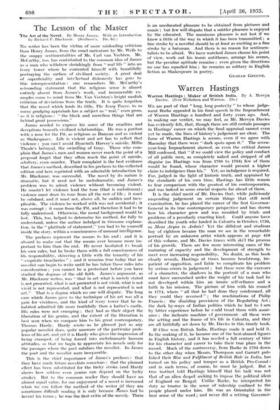The Lesson of the Master
'The Art of the Novel. By Henry James. With an Introduction by Richard P. Blackmun (Scribner's. 10s. 6d.) No writer has been the victim of more misleading criticism than Henry James, from the cruel caricature by Mr. Wells to the snappy sentimentalities of Mr. Carl van Vechten. Mr. McCarthy, too, has contributed to the common idea of James as a man who withdrew shrinkingly from " real life " into an ivory tower where he contented himself with beautifully portraying the surface of civilized society. A great deal of superficiality and intellectual dishonesty has gone to this misrepresentation : one remembers Mr. McCarthy's astounding statement that. the religious sense is almost entirely absent from James's work, and innumerable ex- amples come to mind from Mr. Van Vechten's bright modish criticism of deviations from the truth. It is quite forgotten that the novel which lends its title, The Ivory Tower, to so many grudging appraisals has a subject as " real," even gross, ' as it is religious : " the black and merciless things that are behind great possessions."
. James needed to express his sense of the enmities and deceptions beneath civilized relationships. He was a puritan with a nose for the Pit, as religious as Bunyan and as violent as Shakespeare. Life is violent and art has to reflect that violence : you can't avoid Hyacinth Harvey's suicide, Millie Theale's betrayal, the swindling of Gray. Those who com- plain that James's men and women never reach the point of a proposal forget that they often reach the point of suicide, adultery, even murder. Their complaint is the best evidence that James's method, described in his prefaces to the collected edition and here reprinted with an admirable introduction by Mr. Blackmur, was successful. The novel by its nature is dramatic, but it need not be melodramatic, and James's problem was to admit violence without becoming violent. He mustn't let violence lend the tone (that is melodrama) ; violence must draw its tone from all the rest of life ; it must be subdued, and it must not, above all, be sudden and inex- plicable. The violence he worked with was not accidental ; it was corrupt ; it came from the Pit, and therefore it had to be fully understood. Otherwise, the moral background would be lost. 'This, too, helped to determine his method, for fully to understand, unless the author indulged in tiresome explana- tion, in the " platitude of statement," you had to be yourself inside the story, within a consciousness of unusual intelligence. The prefaces represent the means to his end ; and it is absurd to make out that the means ever became more im- portant to him than the end. He never hesitated. to break his own rules, but he broke them with a full consciousness of his responsibility, shivering a little with the temerity of his exquisite treacheries " ; and it remains true today that no novelist can begin to write until he has taken those rules into consideration ; you cannot be a protestant before you have studied the dogmas of the old faith. James's argument, as Mr. Blackmur writes, was " that in art what is merely stated is not presented,-what is notprelgented is not vivid, what is-not vivid is not represented, and What is not represented is not art.": That is a dogma which no one will dispute. The long care which James gave to the technique of his art was all a gain for vividness, and the kind of ivory tower that he in- habited admitted life more truthfully than -a hatter's castle. His rules were not cramping ; the}' had as their object the liberation of his genius, and the extent of the liberation -is best seen when we compare him to his great contemporary, Thomas Hardy. Hardy wrote - as he pleased just as any popular novelist does, quite unaware of the particular prob- lems of his art, and yet it is Hardy.who gives the impression: f being cramped, of being forced into melodramatic laocoon attitudes, so that we begin to appreciate his novels only: for the . passages where the poet subdues the novelist. In James the poet and the novelist were inseparable.
This is the chief importance of James's prefaces':- that they have made future novelists eonselouS ; that the planned effect has been substituted for the kicky stroke (and Hardy shows -how seldom even genius can depend on the' lucky stroke). But to the common reader they should have an almost equal value, for our enjoyment of a novel is increased when we can follow the method of the writer (if they are sometimes difficult reading it is only because Ames had to invent his terms ; he was the. first-critic of the-novel), There is-an uneducated pleasure to be obtained from pictures and music ; but few will dispute that a subtler pleasure is enjoyed by the educated. The numinous pleasure is not lost if we know a little of the way in which it has been transmitted ; a line stroke by-a novelist should be at least as exciting as a fine stroke by a batsman. And there is no reason for sentimen- talists to be afraid. We have watched James choose his point of view, work out his ironic antitheses, arrange his scenes, but the peculiar aptitude remains ; even given the directions no one has equalled 'him ; he remains as solitary in English fiction as Shakespeare in poetry.
GRAHAM GREENE.










































 Previous page
Previous page